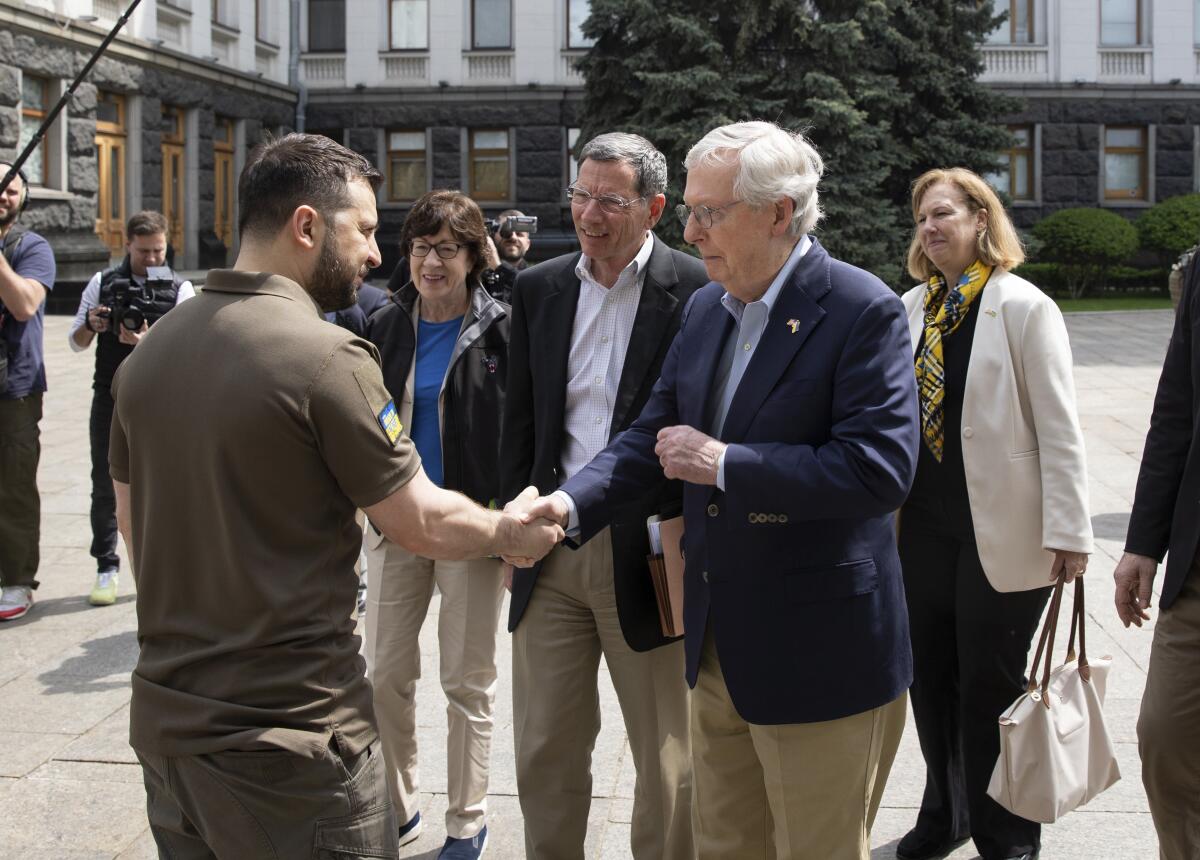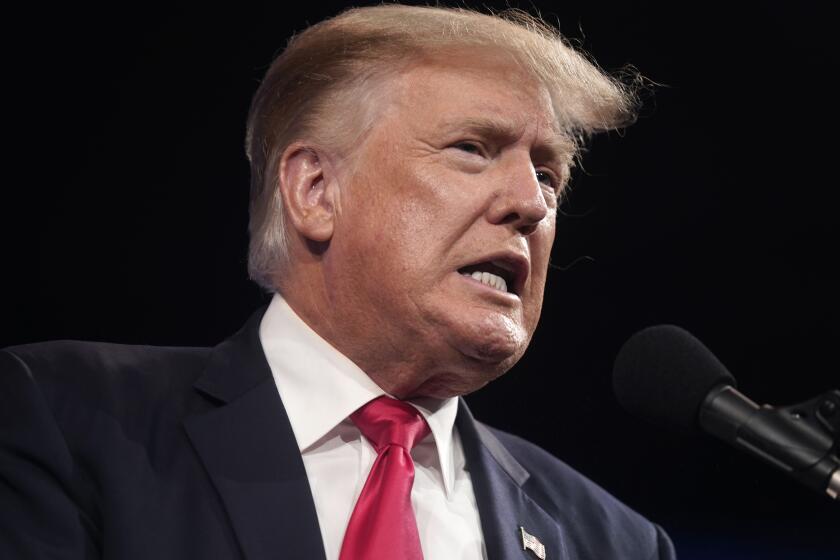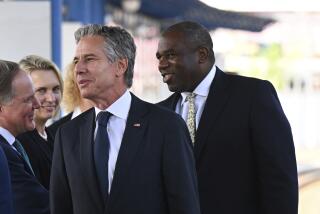Echoing Trump’s isolationism, some Republicans oppose more aid for Ukraine

- Share via
WASHINGTON — Signs of Republican resistance are mounting over a $40-billion aid package to Ukraine, in a re-emergence of the Trump-led isolationist wing of the GOP at a crucial moment in Russia’s ongoing assault on its neighbor.
The Senate voted late Monday to advance the Ukraine aid bill 81-11, pushing it toward President Biden’s desk by week’s end to become law. But vocal objections from some Republicans are sending warning signs after what has been rare and united support for Ukraine as it desperately battles Russia. All 11 no votes in the Senate came from GOP members.
The dissent comes after Senate Minority Leader Mitch McConnell (R-Ky.) led a delegation of GOP senators to Ukraine over the weekend in a show of support, vowing to push past detractors, finish up the aid package and vote this summer on expanding NATO to welcome Sweden and Finland. McConnell finds himself holding down the GOP’s more traditional foreign policy approach, in direct confrontation with the GOP’s “America First” flank, including former President Trump.
“There’s always been isolationist voices in the Republican Party,” McConnell told reporters on a conference call over the weekend from Stockholm. “It won’t create a problem — we’ll get the job done.”
The shift in Congress opens a new political phase in Ukraine’s fight for its survival against the Russian invasion, offering a wake-up call for the Biden administration about its strategy as it resists direct U.S. military troop involvement and depends on votes in the House and Senate to fund the military and humanitarian relief effort.
While a strong bipartisan majority is poised to approve the latest round of Ukraine aid, bringing the U.S. total to $53 billion since the start of Russia’s invasion Feb. 24, it’s clear that Republicans, and some Democrats, are wary of prolonged intervention. While the House overwhelmingly approved the $40-billion package last week, 57 Republicans voted against it.
Moscow is scrambling to adjust to a new security picture in Europe brought about by its invasion of Ukraine, where fighting is ravaging the east.
The most vocal lawmakers are insisting that Congress will not become a blank check for overseas action amid domestic needs as they move away from supporting the U.S.’ longstanding role of championing democracy abroad.
“We have got to take care of things here at home first,” Republican Sen. Bill Hagerty of Tennessee, the former Trump administration’s ambassador to Japan, said on Fox’s “Sunday Morning Futures.”
Republican Sen. Josh Hawley of Missouri, who voted against the aid package, tweeted: “That’s not isolationism. That’s nationalism.”
It’s stronger pushback than just a few months ago, at the start of the war, when Congress made a rare show of bipartisan unity against Russian President Vladimir Putin’s invasion and rushed to Ukraine’s aid.
Ukraine has used postage stamps to boost wartime morale. One image stood out — and sold out. ‘Just felt what we all felt,’ young designer says.
And it comes as the midterm election season is underway in the U.S., with Trump’s influence looming large, particularly with Republican lawmakers desperate for his endorsement and afraid to go against him.
“We have a moral obligation to pass this aid as soon as we can,” Senate Majority Leader Charles E. Schumer (D-N.Y.) said Monday ahead of the procedural vote.
Trump weighed in, breaking the civic norm in the U.S. that former presidents traditionally step aside to allow one president at a time to lead, particularly on foreign policy.
The former president, whose “America First” strategy sought to pull back from U.S. commitments around the world and criticized the NATO military alliance confronting Russia, complained that Democrats are “sending another $40 billion to Ukraine, yet America’s parents are struggling to even feed their children.”
Republicans are unified in attacking the way Biden withdrew from Afghanistan. But that hides a deep split on foreign policy between conservative voters and GOP pundits.
Trump was impeached by the House in 2019 after he withheld military aid to Ukraine and pressured President Volodymyr Zelensky for a favor in digging up dirt on Biden ahead of the U.S. presidential election. He was later acquitted by the Senate.
On the campaign trail in Ohio, the U.S. Senate candidates, Democrat Tim Ryan and Trump-backed Republican J.D. Vance, have been brawling over the Ukraine assistance.
Vance, who quipped some months ago that he doesn’t really care what happens in Ukraine, tweeted last week that Ryan “is pushing billions in foreign aid while the communities he serves in Congress have been decimated.”
Ryan’s team released an ad suggesting that Vance as a venture capitalist had profited off a social media platform that is used to spread Russian propaganda.
Get our L.A. Times Politics newsletter
The latest news, analysis and insights from our politics team.
You may occasionally receive promotional content from the Los Angeles Times.
The first round of Ukraine aid, $13.9 billion, was swiftly approved by Congress in March as part of a broader bill to fund the government. It came just before Zelensky delivered a video address at a joint meeting of Congress to several standing ovations.
But as the war drags on, U.S. lawmakers, particularly Republicans, have become more assertive in their resistance, posing questions for U.S. strategy ahead.
Republican Sen. Rand Paul of Kentucky single-handedly blocked a vote on the latest aid package last week when he demanded an inspector general’s report on how the money is being spent. The libertarian-leaning Paul routinely blocks spending bills with a filibuster, but he is also a non-interventionist when it comes to foreign policy who had great sway during the Trump era, encouraging the then-president’s instincts against engaging in overseas actions.
“While I sympathize with the people of Ukraine, and commend their fight against Putin, we cannot continue to spend money we don’t have,” Paul said in a series of tweets about his holdup of the vote.
Outside groups influential with Republicans, including Heritage Action, have raised questions about the Ukraine spending. Fox News host Tucker Carlson said on his show last week that he was calling every senator’s office to see where he or she stood on the issue.
More to Read
Get the L.A. Times Politics newsletter
Deeply reported insights into legislation, politics and policy from Sacramento, Washington and beyond. In your inbox twice per week.
You may occasionally receive promotional content from the Los Angeles Times.













